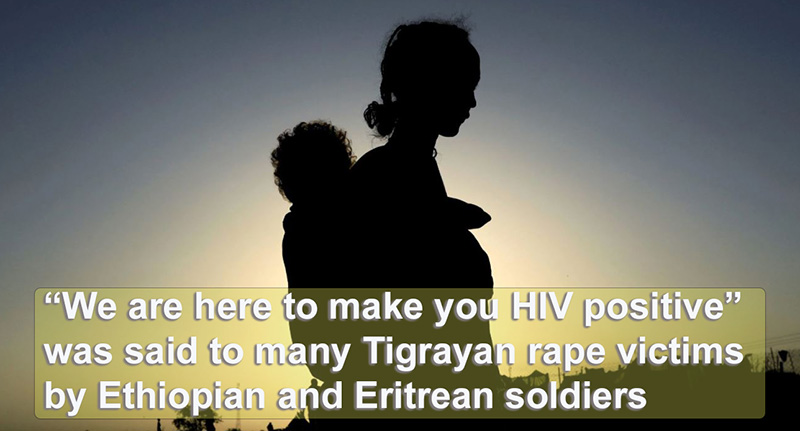
Many recorded reports by health care facilities in Tigray of Tigrayan women who were raped by admittedly HIV positive Ethiopian and Eritrean soldiers who boasted their intent to subsequently transmit it to the victim. Under the most common internationally recognized definitions of biological warfare these actions against civilians would qualify as biological warfare. To qualify an act of biological warfare requires that an agent be introduced in a forceful way intended to harm via a mechanism. An infectious agent was used, HIV, which would not normally have entered the victim except for the violation organized by the invading forces using a stockpile of means to introduce the weapon, the recruited HIV positive soldiers who were ordered to rape civilian women.
There have been some publications about the incidence of HIV in the Ethiopian Army. These indicate that regular testing and counseling is done about the risk of acquiring and transmitting HIV. There was higher incidence of HIV in the soldiers compared with the civilian population. Discussions were held on numerous occasions between medical researchers and Ethiopian Army leadership about the potential for spread of HIV by sexual violence in war. Unfortunately rather than act in preventative manner it appears the Ethiopian leadership choose to weaponize those infected with HIV.
Under United Nations Security Council Resolution (1540) passed in 2004 it recognizes that biological warfare can cause “in addition to the tragic loss of lives, such events could cause food shortages, environmental catastrophes, devastating economic loss, and widespread illness, fear and mistrust among the public”.
The refusal of Ethiopia to supply humanitarian aid including medications to treat HIV infected persons including those occurring after rape is a continuation of the impact of the use of a biological weapon making it an even greater war crime and crime against humanity. The United Nations Office for Coordination of Humanitarian Affairs has documented the strict searching and supervision of the Ethiopian government over any and all medical supplies going to Tigray. Since the first supplies were sent in July 2021 many times key drugs for treatment of HIV and other conditions were removed by security forces before the shipment was allowed to be delivered to Tigray.
Such acts violate the UN Charter. The Secretary General should “”carry out prompt investigations in response to allegations of the possible use of chemical and bacteriological (biological) and toxin weapons that may constitute a violation of the 1925 Geneva Protocol or other relevant rules of customary international law. If any Member State provides the Secretary-General with a report of such allegations, the Secretary-General is authorized to launch an investigation to ascertain in an objective and scientific manner the facts of the matter, including dispatching a fact-finding team to the site(s) of the alleged incident(s), and to report the results of the investigation to all Member States”.

